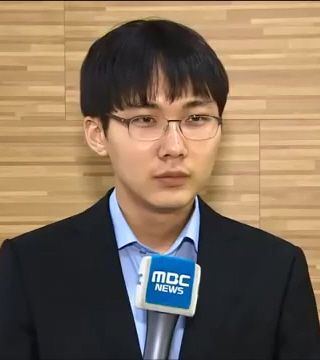The Changqi Cup, or Chang-ki Cup, is a Go competition in China.
LG Cup World Baduk Championship is a Go competition.
The Nongshim Cup is a Go tournament sponsored by Nongshim, an instant noodle food company of South Korea.

Park Junghwan is a South Korean professional Go player of 9-dan rank.
Yang Dingxin is a Chinese professional Go player.
Shi Ke is a Chinese footballer who currently plays as a centre-back for Shandong Taishan in the Chinese Super League.

Xie Pengfei is a Chinese professional footballer who currently plays for Chinese Super League club Shanghai Shenhua and the China national team.
Feng Jin is a Chinese professional footballer who plays as a midfielder for Chinese Super League club Shanghai Port.

Ke Jie is a Chinese professional Go player of 9 dan rank. He was born on August 2, 1997, in Liandu District, Lishui City, Zhejiang Province.
The Future of Go Summit was held in May 2017 by the Chinese Go Association, Sport Bureau of Zhejiang Province and Google in Wuzhen, Zhejiang, the permanent host of the World Internet Conference. It featured five Go games involving AlphaGo and top Chinese Go players, as well as a forum on the future of AI. It was Google’s biggest public event in partnership with the Chinese government since Google China's search engine was moved out of mainland China to Hong Kong due to the government censorship in 2010. It was seen as a charm offensive launched by Google toward Chinese officials, being part of effort to reopen China's market.
Wei Rui is a Chinese Sanda kickboxer who currently fights out of Da Dong Xiang fight club. On February 25, 2017, he won the K-1 World GP Lightweight Champions belt making him China's first K-1 World Champion.
Tang Weixing is a Chinese professional go player. He has won three international titles, with two championships in the Samsung Cup and one in the Ing Cup (2016).
Ryo Ichiriki is a Japanese professional 9-dan Go player. As Go player, he was a pupil of So Kofuku. Since 2020 he has also worked as a journalist for Kahoku Shimpo.
Shin Jin-seo is a South Korean professional Go player. He has won seven major international championships: the LG Cup in 2020, 2022 and 2024; the Chunlan Cup in 2021; the Samsung Cup in 2022; the Ing Cup in 2023; and the Quzhou-Lanke Cup in 2024. He is the number one ranked Korean player in the Korea Baduk Association's official rankings, a spot which he first reached in November 2018 and has held continuously since January 2020.
Shin Min-jun is a South Korean professional Go player.
The MLily Cup, officially the MLily Meng Baihe Cup World Go Open Tournament is an international Go tournament. It is organized by the International Go Federation and the Chinese Weiqi Association. The tournament was created in 2013 and is held every two years.
Xie Ke is a Chinese professional Go player.
The Globis Cup is an international Go competition for players under the age of 20. The tournament was created in 2014 and is held annually. It is organized by the Nihon Ki-in and sponsored by Globis, a Japanese company.
Gu Zihao is a Chinese professional go player. He is the winner of two major international championships: the Samsung Cup in 2017 and the Quzhou Lanke Cup in 2023.
Ding Hao is a Chinese professional Go player.


